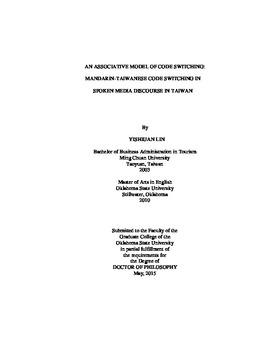| dc.contributor.advisor | Preston, Dennis | |
| dc.contributor.author | Lin, Yishiuan | |
| dc.date.accessioned | 2016-09-29T18:35:42Z | |
| dc.date.available | 2016-09-29T18:35:42Z | |
| dc.date.issued | 2015-05 | |
| dc.identifier.uri | https://hdl.handle.net/11244/45182 | |
| dc.description.abstract | This dissertation proposes an associative model of CS to analyze the phenomena of code switching (CS). Specifically, the associative model of CS is applied to speakers' use of Taiwanese in Mandarin-dominant spoken media discourse. Gumperz's (Blom & Gumperz, 1972; Gumperz, 1982) and Myers-Scotton's (1993a) theoretical foundation is used as a basis for the associative model of CS. The associative model of CS emphasizes the important role of association in language switching and includes two types of language switching: code switching and utterance switching. With regard to the two types of language switching, the association Taiwanese or a Taiwanese utterance has can occur at the community, activity, and individual levels. With regard to communicative effects, the association Taiwanese or a Taiwanese utterance has at various levels is motivationally relevant to envisioning the use of Taiwanese or the Taiwanese utterance to create certain communicative effects, which in turn are realized by switching to Taiwanese or the Taiwanese utterance. | |
| dc.description.abstract | The associative model of CS is examined by 50 CS cases collected in this dissertation, along with the comparison with Gumperz's, Auer's (1984), and Myers-Scotton's theoretical notions, by the CS examples presented in previous CS studies in Taiwan, and by eight Taiwanese interviewees' responses to 10 CS cases collected in this dissertation. | |
| dc.description.abstract | The findings of the dissertation suggest that the associative model of CS can effectively explain various CS cases presented in this study and in previous CS studies in Taiwan as well as the interviewees' views about CS. | |
| dc.description.abstract | This dissertation contributes to the sociolinguistics field by proposing the associative model of CS and addressing the problem of applying various theories in different CS studies as well as to the CS research in Taiwan in a way that it provides another perspective in explaining speakers' use of CS in Mandarin-dominant spoken media discourse, which has not received sufficient research attention. | |
| dc.format | application/pdf | |
| dc.language | en_US | |
| dc.rights | Copyright is held by the author who has granted the Oklahoma State University Library the non-exclusive right to share this material in its institutional repository. Contact Digital Library Services at lib-dls@okstate.edu or 405-744-9161 for the permission policy on the use, reproduction or distribution of this material. | |
| dc.title | Associative model of code switching: Mandarin-Taiwanese code switching in spoken media discourse in Taiwan | |
| dc.contributor.committeeMember | Moder, Carol | |
| dc.contributor.committeeMember | Cheng, An | |
| dc.contributor.committeeMember | Blum, Denise | |
| osu.filename | Lin_okstate_0664D_13920.pdf | |
| osu.accesstype | Open Access | |
| dc.type.genre | Dissertation | |
| dc.type.material | Text | |
| thesis.degree.discipline | English | |
| thesis.degree.grantor | Oklahoma State University | |
